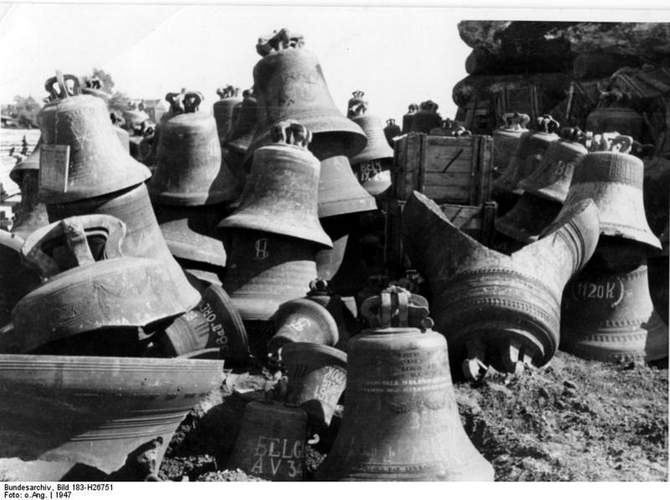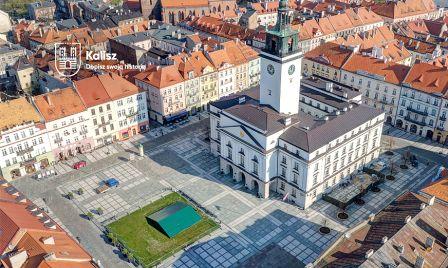What was life like for Poles from the Russian partition under German occupation during WW1? I know that the Germans set up a puppet state there in 1917, but apart from this I know nothing. I've tried searching the internet a bit for information, but it's mostly swamped with stuff about WW2 (probably because I'm limited to English-language sources).
German treatment of Poles (Russian partition) during WW1?
narikis - Germans confiscated lots of farm animals in the occupied zone (mostly cattle) from what i have read in Polish - also most if not all church bells were confiscated to be recast as ammunition
otherwise Germans aimed to create a vassal state from the Russian partition with Polish cultural institutions - so there was a huge difference between the I World War occupation and the II World War occupation
otherwise Germans aimed to create a vassal state from the Russian partition with Polish cultural institutions - so there was a huge difference between the I World War occupation and the II World War occupation
@gumishu Thank you. Do you know what their attitude was toward civilians there? For example was there large use of slave-labour from that part of Poland during WW1, or did they mostly leave Polish civilians alone (as long as they gave up those supplies you mentioned)?
Well, I remember reading Wiech about hardships of everyday life and shortages in shops: people "were queuing for wooden bread." There was no sugar or meat.
Also, Germans massacred Kalisz in 1914, killing hundreds of innocent civilians.
Pogrom of Kalisz
en.wikipedia.org/wiki/Destruction_of_Kalisz
Yes, I will never forget those photos:
Also, Germans massacred Kalisz in 1914, killing hundreds of innocent civilians.
Pogrom of Kalisz
en.wikipedia.org/wiki/Destruction_of_Kalisz
most if not all church bells were confiscated to be recast as ammunition
Yes, I will never forget those photos:

wdrowka_po_drawskich.jpg
For example was there large use of slave-labour from that part of Poland during WW1
to be honest i never heard of such attempts - there was a drive to weaken Polish industry to create unemployment and force Poles in the German mainland (just read an article about it concerning Łódź's textile industry) but no slave-labour was in question to my knowledge
Poles worked in agriculture and forestry in Germany even before the Great War and war hardships probably made more of them to seek work in Germany - that's my guess
@pawian I wasn't aware of that, thank you for telling me, very sad indeed. Did this kind of thing continue against Poles from the Russian-partition during the rest of the war? Or was it a one-off atrocity?
@gumishu Interesting, thank you.
@gumishu Interesting, thank you.
Or was it a one-off atrocity?
I never heard of any similar cases in the first world war to be honest
Neither have I. Kalisz was unlucky coz that German unit which occupied and massacred the city was most probably commanded by a sadistic psychopath - his name was major Hermann Preusker.
@pawian
@gumishu
The wikipedia article that pawian posted claims that some German troops in Kalisz refused to follow the repression orders from their officers. If it's true, I wonder if they were Poles from the German partition, or just Germans who thought their leaders (like Preusker) were going too far...
Do we know if Preusker received any reprimand/punishment from the German command for his role in the massacre? Or did they turn a blind eye?
@gumishu
The wikipedia article that pawian posted claims that some German troops in Kalisz refused to follow the repression orders from their officers. If it's true, I wonder if they were Poles from the German partition, or just Germans who thought their leaders (like Preusker) were going too far...
Do we know if Preusker received any reprimand/punishment from the German command for his role in the massacre? Or did they turn a blind eye?
I wonder if they were Poles from the German partition, or just Germans
Now it is impossible to establish that here. You would have to ask at the source - e..g, Kalisz Museum.
Or did they turn a blind eye?
Nothing is known about it. Only History and God judged him - his name has become the symbol of barbaric destruction and murder.
en.wikipedia.org/wiki/Hermann_Preusker
@pawian
Yes, perhaps we may never know about those soldiers. But if I get a chance to visit Kalisz, it is something I might try to find out.
Hm, I wonder if there are German records somewhere which could indicate how the German command reacted to Kalisz. Maybe I can ask a German acquaintance to help me research a bit...
Yes, perhaps we may never know about those soldiers. But if I get a chance to visit Kalisz, it is something I might try to find out.
Hm, I wonder if there are German records somewhere which could indicate how the German command reacted to Kalisz. Maybe I can ask a German acquaintance to help me research a bit...
But if I get a chance to visit Kalisz, it is something I might try to find out.
Do visit it. It had already been a pretty city before the WW1, called the Venice of the North. Later they rebuilt it. I have always loved looking at the aerial views of the centre.

SARProzwiazaniekon.jpg
@pawian
Yes, it looks lovely. Just have to wait for this dratted virus to go away...
Yes, it looks lovely. Just have to wait for this dratted virus to go away...
What was life like for Poles from the Russian partition under German occupation during WW1?
So, Kalisz Pogrom was an isolated incident.
Generally we can say that not much changed for Poles as the Russian occupation was replaced by the German one. One difference - at least Poles weren`t exiled to Siberia on tsar`s orders anymore.
@pawian
Well, small victories I guess. Plus the creation of the puppet Kingdom of Poland in 1917, which seems like the first time Poland reappeared on the map since the partitions. I'm sure if Germany won it would have just become a dependant vassal, but at least it was a step in the right direction...
Well, small victories I guess. Plus the creation of the puppet Kingdom of Poland in 1917, which seems like the first time Poland reappeared on the map since the partitions. I'm sure if Germany won it would have just become a dependant vassal, but at least it was a step in the right direction...
Kingdom of Poland in 1917
Yes, such a proclamation took place indeed but nobody in Poland treated it seriously coz the Central powers were on the losing side already. After the proclamation Polish troops comanded by Piłsudski refused to take the oath of allegiance to Germans and were sent to isolation camps. Poles knew that Germans would finally lose so there was no point in participating in their fancy projects.
en.wikipedia.org/wiki/Oath_crisis
@pawian
Yes, I've heard of the oath crisis. Still though, it does seem that a Polish government and armed forces existed under German rule during WW1:
en.wikipedia.org/wiki/Polska_Si%C5%82a_Zbrojna
en.wikipedia.org/wiki/Provisional_Council_of_State
en.wikipedia.org/wiki/Regency_Council_(Poland)
I guess some Poles were willing to take a chance on Germany, but probably only for as long as Russia was a problem. In fact, I think Piłsudki's original plan had been to support the Central Powers until Russia was defeated, and then support the Entente until the Central Powers were defeated, so that's probably why he refused the German oath in 1917.
Yes, I've heard of the oath crisis. Still though, it does seem that a Polish government and armed forces existed under German rule during WW1:
en.wikipedia.org/wiki/Polska_Si%C5%82a_Zbrojna
en.wikipedia.org/wiki/Provisional_Council_of_State
en.wikipedia.org/wiki/Regency_Council_(Poland)
I guess some Poles were willing to take a chance on Germany, but probably only for as long as Russia was a problem. In fact, I think Piłsudki's original plan had been to support the Central Powers until Russia was defeated, and then support the Entente until the Central Powers were defeated, so that's probably why he refused the German oath in 1917.
to support the Central Powers until Russia was defeated, and then support the Entente until the Central Powers were defeated,
Exactly. Devilish concept of his. hahaha
And then there was Wielkopolskie Rising of 1919 and 3 Silesian Risings of 1919-1921 during which Poles regained their old lands. And independent Poland was born.
@pawian
Yes, plenty of postwar struggles between Germans (like the Freikorps) and Poles to rebuild Poland. And of course Russian Bolsheviks coming from the east, but that's another story...
Yes, plenty of postwar struggles between Germans (like the Freikorps) and Poles to rebuild Poland. And of course Russian Bolsheviks coming from the east, but that's another story...
I know that the Germans set up a puppet state there in 1917
That was in 1916. You may find some info on the role of the Germans in Poland at that time, see this link:
en.wikipedia.org/wiki/History_of_Poland_during_World_War_I
There is a book on that published in English by German historian Jochen Böhler in which you may probably find more info on the subject:
"Civil War in Central Europe, 1918-1921: The Reconstruction of Poland (Greater War)"
@Ziemowit
Correct me if I'm wrong, but I think the proclamation was in 1916, but the actual state/government wasn't established until 1917.
Thank you for the book recommendation.
Correct me if I'm wrong, but I think the proclamation was in 1916, but the actual state/government wasn't established until 1917.
Thank you for the book recommendation.
Indeed, on November 5, 1917, Germany and Austria-Hungary jointly declared that a puppet state Kingdom of Poland might be created.
@Ziemowit
Sorry, I think you mean 5 November 1916? Or was there another proclamation in November 1917?
Anyway, it seems they did set up some form of puppet government in 1917:
en.wikipedia.org/wiki/Provisional_Council_of_State
en.wikipedia.org/wiki/Regency_Council_(Poland)
By the way, if anyone is interested, I just came across this book which looks like it might have good information on the topic of this thread:
amazon.co.uk/Elusive-Alliance-German-Occupation-Poland/dp/0674286014/
Sorry, I think you mean 5 November 1916? Or was there another proclamation in November 1917?
Anyway, it seems they did set up some form of puppet government in 1917:
en.wikipedia.org/wiki/Provisional_Council_of_State
en.wikipedia.org/wiki/Regency_Council_(Poland)
By the way, if anyone is interested, I just came across this book which looks like it might have good information on the topic of this thread:
amazon.co.uk/Elusive-Alliance-German-Occupation-Poland/dp/0674286014/
Anyway, it seems they did set up some form of puppet government in 1917:
Yes, puppet. After realising it was puppet, Piłudski resigned and refused to take the oath . Other members also took their leave. The Council worked from January to August 1917 when it was dissolved.
@pawian
After that I think the Regency Council took over from September 1917 until the end of the war, which was also staffed by Poles (but of course, still a puppet). If wikipedia is to be believed, they were the ones who first declared Polish independence in 1918.
After that I think the Regency Council took over from September 1917 until the end of the war, which was also staffed by Poles (but of course, still a puppet). If wikipedia is to be believed, they were the ones who first declared Polish independence in 1918.
